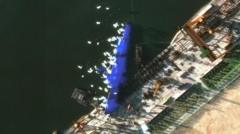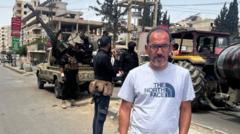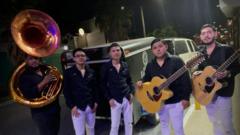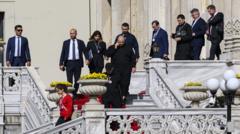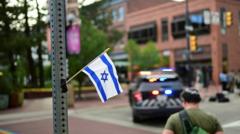Amid ongoing protests against President Erdogan's government, opposition leader Ekrem Imamoglu remains in custody, fueling nationwide unrest as citizens seek democratic reform.**
Turmoil in Turkey: Protests Continue as Opposition Leader Detained**
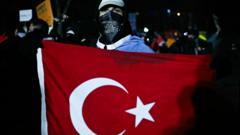
Turmoil in Turkey: Protests Continue as Opposition Leader Detained**
Unrest escalates in Turkey as Erdogan accuses rivals of inciting violence, with protests sparked by the detention of Istanbul's Mayor.**
In Turkey, the sixth night of protests has emerged in response to the detention of Istanbul Mayor Ekrem Imamoglu, viewed by many as a political indictment fueled by President Recep Tayyip Erdogan’s government. Erdogan criticized opposition parties, labeling the ongoing unrest as a "movement of violence" and accusing them of inciting chaos following Imamoglu's arrest last week on corruption charges—allegations that Imamoglu claims are politically driven.
As tensions continue, the main opposition party, the Republican People's Party (CHP), which announced Imamoglu as its presidential candidate for the 2028 election, hinted that demonstrations might conclude on Tuesday without clarifying its future action plan. Erdogan has called the protests "evil," urging unrest to cease while dismissing the opposition's claims and alleging a slew of provocative statements.
On the ground, protests have largely remained peaceful, contrasting with earlier confrontations that resulted in police deploying water cannons. Young demonstrators, many of whom have only known Erdogan's rule, are at the forefront of these protests. They express a range of political sentiments and a shared demand for government accountability, despite not aligning completely with any single political faction.
Among the demonstrators is Lydia, who remarked on the oppressive tactics of the authorities, characterizing the use of pepper spray against them as insecticidal. The protests, sparked mainly by frustration towards the government, have drawn participants from various political backgrounds, uniting them against perceived authoritarianism.
The CHP's leader, Ozgur Ozel, rallied participants on Monday, framing the demonstration as an act of resistance against "fascism." Alongside expressing solidarity with Imamoglu, Ozel announced plans to visit him in jail and petition for his release pending trial. Imamoglu's viability as a presidential candidate remains uncertain due to his arrest and the university's decision to revoke his degree, which conflicts with constitutional eligibility requirements for presidency.
Many citizens view the detention as a broader indicator of deteriorating democratic standards in Turkey, with sentiments echoing from past unrest like the Gezi protests of 2013. Protesters adamantly claim that the fight is not merely about Imamoglu but a larger struggle for democracy and a return to civil rights in Turkey. As the political landscape shifts, questions loom about Erdogan’s potential plans for future elections, given his constitutional term limitations.
The Turkish government maintains that judicial processes remain independent, rejecting claims that the arrests are politically motivated. As the situation unfolds, the nation's trajectory hinges on the intersection of protest dynamics and state response, with the stakes for democracy in Turkey at a critical juncture.
As tensions continue, the main opposition party, the Republican People's Party (CHP), which announced Imamoglu as its presidential candidate for the 2028 election, hinted that demonstrations might conclude on Tuesday without clarifying its future action plan. Erdogan has called the protests "evil," urging unrest to cease while dismissing the opposition's claims and alleging a slew of provocative statements.
On the ground, protests have largely remained peaceful, contrasting with earlier confrontations that resulted in police deploying water cannons. Young demonstrators, many of whom have only known Erdogan's rule, are at the forefront of these protests. They express a range of political sentiments and a shared demand for government accountability, despite not aligning completely with any single political faction.
Among the demonstrators is Lydia, who remarked on the oppressive tactics of the authorities, characterizing the use of pepper spray against them as insecticidal. The protests, sparked mainly by frustration towards the government, have drawn participants from various political backgrounds, uniting them against perceived authoritarianism.
The CHP's leader, Ozgur Ozel, rallied participants on Monday, framing the demonstration as an act of resistance against "fascism." Alongside expressing solidarity with Imamoglu, Ozel announced plans to visit him in jail and petition for his release pending trial. Imamoglu's viability as a presidential candidate remains uncertain due to his arrest and the university's decision to revoke his degree, which conflicts with constitutional eligibility requirements for presidency.
Many citizens view the detention as a broader indicator of deteriorating democratic standards in Turkey, with sentiments echoing from past unrest like the Gezi protests of 2013. Protesters adamantly claim that the fight is not merely about Imamoglu but a larger struggle for democracy and a return to civil rights in Turkey. As the political landscape shifts, questions loom about Erdogan’s potential plans for future elections, given his constitutional term limitations.
The Turkish government maintains that judicial processes remain independent, rejecting claims that the arrests are politically motivated. As the situation unfolds, the nation's trajectory hinges on the intersection of protest dynamics and state response, with the stakes for democracy in Turkey at a critical juncture.



